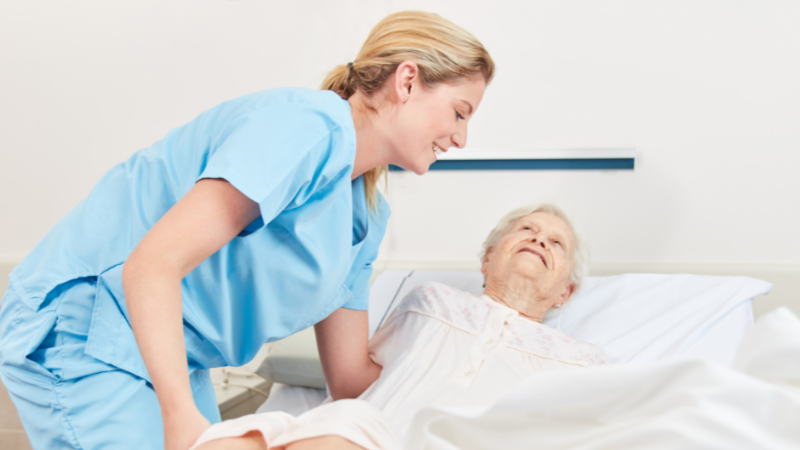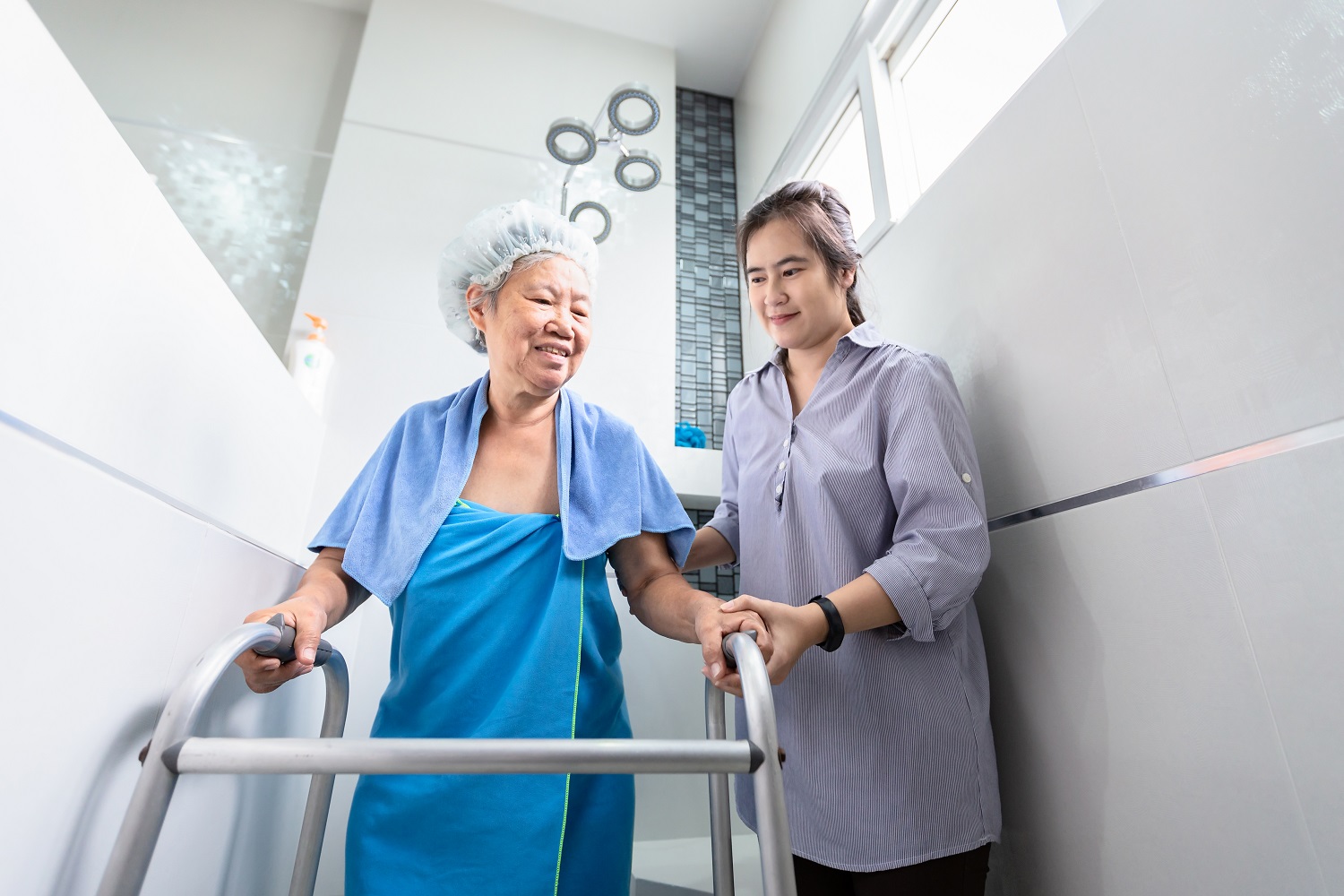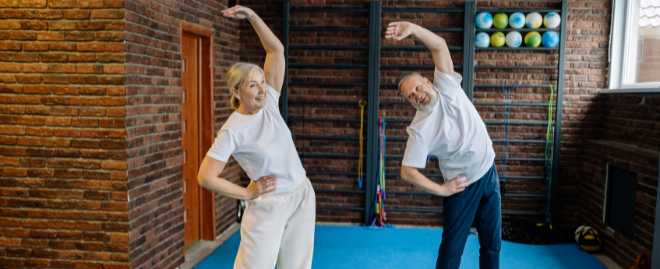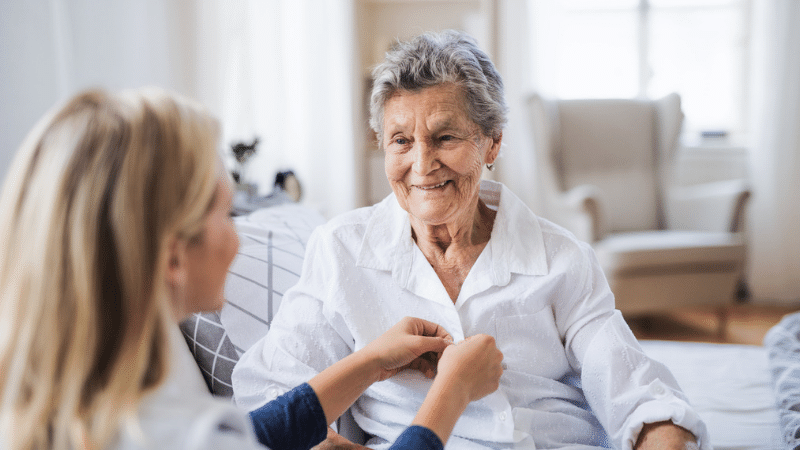Seniors who become immobile may require bedridden patient care. These individuals struggle or no longer have the ability to stand, walk, or sit independently. When an aging adult becomes immobile, caregivers should perform certain tasks to ensure their quality of life.

Immobile, or bedridden, seniors may be affected by certain ailments that make it difficult to physically move around. Paralysis or obesity are two conditions that can cause immobility. Further immobilizing diseases include Parkinson’s, Alzheimer’s, Multiple Sclerosis, and early onset dementia.
Older people who remain in bed for extended periods are vulnerable to a series of physical complications. As a result, specialized care is a requisite for seniors who suffer from immobility. Handicap International reports certain complications can emerge in bedridden patients.
Muscle weakness or atrophy and muscle shortness can develop when seniors remain in bed for significant amounts of time. Pressure sores, blood circulation problems, and bone demineralization can occur. Respiratory problems, such as lung infections, may also develop in bedridden older adults.
Bedridden patients who receive quality care from family or professional caregivers are likely to experience greater physical comfort and emotional well-being. Immobile seniors will also need assistance with the activities of daily living. Here are key caregiver responsibilities that support immobile seniors.
1. Assist with hygiene
Hygiene is an important task. Seniors who are bedridden should receive assistance with hygiene from their caregivers. Bathing and dental care are just two components of daily personal hygiene. Caregivers are responsible for giving the senior a sponge bath or using a shower chair to bathe her.
Oral hygiene responsibilities include helping the senior brush her teeth. In fact, caregivers are advised to place a toothbrush, toothpaste, a bowl of water, and a spit bowl on the senior’s bedside table. Cut the senior’s fingernails and toenails after bathing, when the nails are soft.

2. Change bedsheets regularly
Ensuring proper bed hygiene is another crucial responsibility of a caregiver, considering the bedridden senior spends most of her time in bed. Clean sheets are a must. Bedridden older adults may use incontinence pads, which can sometimes allow the sheets to become soiled.
Change soiled bedsheets often, since they may be stained with food, be embedded with dirt, or be covered with skin particles. Damp bedsheets must be changed promptly. Dark and damp areas can invite bed bugs. Whenever possible, caregivers are advised to choose cotton bedsheets for their breathability.
3. Serve healthy meals
Daily nutrition is of utmost importance to the health of immobile elderly individuals. Caregivers who prepare and serve balanced meals rich in nutrients and vitamins promote cardiovascular health, reduce inflammation, increase bone density, and help strengthen memory in the seniors they serve.
Caregivers are advised to consult with the senior’s physician or dietician to determine the best diet. Cater to the senior’s meal preferences: some older people favor several smaller meals, while others enjoy three main dishes daily. Keep water nearby for the senior to sip throughout the day.

4. Engage with the senior
Feeling unwanted or discarded can be detrimental to the bedridden senior’s emotional well-being. Caregivers can combat these negative feelings in care recipients by helping them feel valued. Start conversations about topics of interest, play board games, or read books to the senior.
Keeping the senior entertained is another responsibility a caregiver should prioritize. Place a television in the senior’s room and give her the remote. Newspapers and magazines should be kept within the senior’s reach. Engaging with immobile seniors gives them reasons to feel cheered.
5. Encourage stretching
Helping immobile seniors stay mobile is important to increasing their overall physical health. Assist them with stretching exercises that are within their range of motion. Regular stretching and improving their blood flow provide numerous health benefits to those who spend most of their time in bed.

6. Prevent bedsores
Sitting or lying in a position for extended periods can result in bedsores. Caregivers are responsible for preventing bedsores by repositioning the senior every few hours. If the senior is able, ask her to sit or lie in a different position or engage in minor exercises within her physical ability.
Caregivers can also prevent bedsores by keeping the elderly care recipient’s skin clean and dry. Place pillows along areas where parts of the body make contacts, such as between the knees and ankles. Caregivers should frequently examine the ankles, hips, and tailbone for sores.
7. Set a schedule
Caregivers who establish a routine can stay on track with the senior’s medications, hydration, meals, and sleep. Additionally, older adults feel a sense of security when activities are performed on a set schedule each day. In general, routines reduce stress in both the caregiver and senior.

An immobile senior’s quality of life can be significantly improved when the right care and attention are regularly delivered. It’s important to rely on the advice of medical professionals and support from professional in-home caregivers to ensure the elderly individual remains as comfortable as possible.
Immobile seniors require ongoing attention to promote their life satisfaction and overall health. Families that are unable to provide constant, quality care can rely on the professional in-home support from Assisting Hands Home Care. We offer live-in and 24-hour home care options for bedridden seniors.
Continual, daily care via our live-in care option is ideal for seniors who need supervision during the day. Elderly care recipients benefit from a live-in caregiver who resides in the home and provides care with morning routines, bathing, dressing, meals, transportation, housekeeping, and bedtime routines.
Assisting Hands Home Care 24-hour care option is practical for seniors who suffer from a chronic medical conditions. Your elderly loved one will receive constant monitoring from each of our alternating, attentive caregivers, who remain awake and alert throughout each 12-hour shift.
Seniors with ongoing care needs are encouraged to consider Assisting Hands Home Care for compassionate live-in or 24-hour care. We promote the quality of life for immobile seniors living in Batavia, Aurora, Geneva, St. Charles, Barlett, Illinois, and the surrounding areas. Call us at (630) 948-8193 for an in-home consultation and start elder care today.















